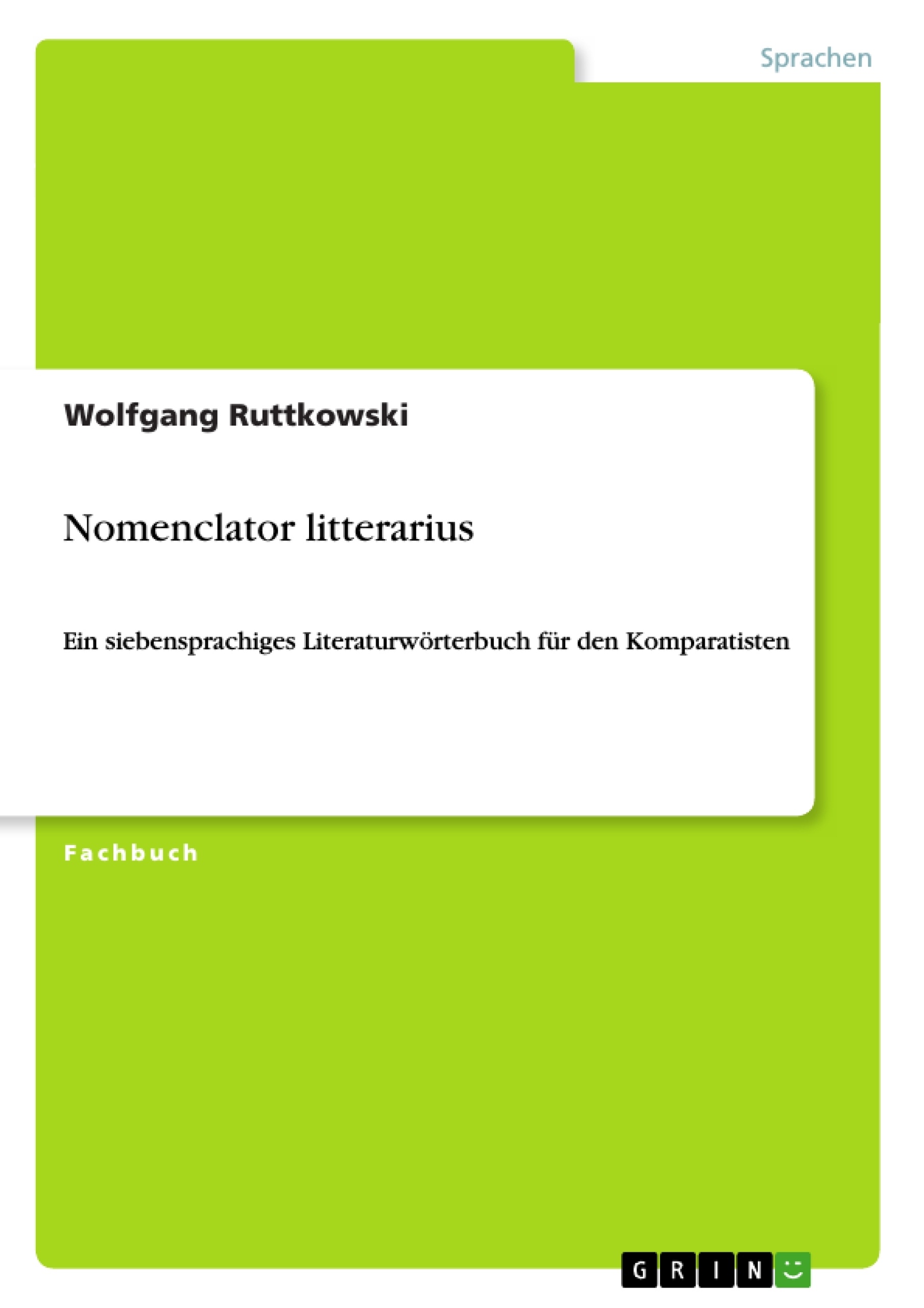Dieses mehrsprachige Literaturlexikon wurde von sechs amerikanischen und einem japanischen Komparatisten unter der Leitung von Prof. Dr. Wolfgang Ruttkowski (siehe dt. WIKIPEDIA) zusammengestellt. Da es das erste und einzige seiner Art war und noch immer ist, wurde es innerhalb kurzer Zeit hauptsächlich an Komparatisten und Bibliotheken ausverkauft.
Jeder der enthaltenen 2593 Begriffe wird in sieben Sprachen (dt., engl., frz., ital., niederl., russ., span.) aufgeführt und im Index wiedergegeben. Begriffe, die hauptsächlich in einer Sprache verwendet werden, stehen am Anfang der Gruppe. Zusätzlich sind viele international bekannte Gattungsbegriffe (z.B. arab., ind., pers.) mit ihren Übersetzungen aufgeführt. Alle sind im Index leicht zu finden. In einem separaten Index am Ende werden die russischen Begriffe in kyrillischen Buchstaben aufgeführt.
Wir hoffen, dass diese unveränderte Neuauflage die vielen Anfragen potentieller Benutzer befriedigt.
**
Über 3000 literarische Sachbegriffe mit ihren englischen, niederländischen, französischen, spanischen, italienischen und russischen Übersetzungen.
More than 3000 literary concepts with ther German, Dutch, French, Spanish, Italian, and Russian translations.
Meer dan 3000 literaire termen met vertalingen in het Duits, Engels, Frans, Spaans, Italiaans en Russisch.
Plus de 3000 termes littéraires avec leurs traductions en allemand, anglais, néerlandais, espagnol, italien et russe.
Más de 3000 expresiones literarias con su equivalencia en alemán, inglés, holandés, francés, italiano y ruso.
Più di 3000 concetti letterari con le loro traduzioni tedesche, inglesi, olandesi, francesi, spagnole e russe.
Bol'se 3000 literaturnych ponjatij s nemeckimi, anglijskimi, gollandskimi, francuzskimi, ispanskimi i italjanskimi perevodami.
Inhaltsverzeichnis
- Unveränderter Reprint
Zielsetzung und Themenschwerpunkte
Der Text befasst sich mit dem Thema des unveränderten Reprints und seinen Auswirkungen.
- Der Prozess des Reprints
- Die Bedeutung von Unverändertheit
- Mögliche Auswirkungen des Reprints
- Die Rolle von Reprints in der Wissenschaft
Zusammenfassung der Kapitel
Das Kapitel "Unveränderter Reprint" behandelt die technischen Aspekte des Reprints und seine Bedeutung für die Erhaltung von wissenschaftlichen Werken.
Schlüsselwörter
Unveränderter Reprint, Wissenschaft, Erhaltung, Reproduktion, Dokument, Original.
Häufig gestellte Fragen
Was ist der Nomenclator litterarius?
Der Nomenclator litterarius ist ein mehrsprachiges Literaturlexikon, das über 3000 literarische Sachbegriffe in sieben verschiedenen Sprachen aufführt und übersetzt.
Welche Sprachen sind im Lexikon enthalten?
Das Werk enthält Begriffe und Übersetzungen in Deutsch, Englisch, Französisch, Italienisch, Niederländisch, Russisch und Spanisch.
Wer leitete die Zusammenstellung des Lexikons?
Die Zusammenstellung erfolgte unter der Leitung von Prof. Dr. Wolfgang Ruttkowski durch ein Team von sechs amerikanischen und einem japanischen Komparatisten.
Wie sind die russischen Begriffe im Werk dargestellt?
Die russischen Begriffe sind in einem separaten Index am Ende des Buches zusätzlich in kyrillischen Buchstaben aufgeführt.
Was ist die Zielsetzung dieses Reprints?
Da das Original schnell ausverkauft war, dient die unveränderte Neuauflage dazu, die anhaltende Nachfrage von Komparatisten und Bibliotheken nach diesem einzigartigen Referenzwerk zu befriedigen.
- Quote paper
- Dr. Wolfgang Ruttkowski (Author), 1980, Nomenclator litterarius, Munich, GRIN Verlag, https://www.grin.com/document/286724



